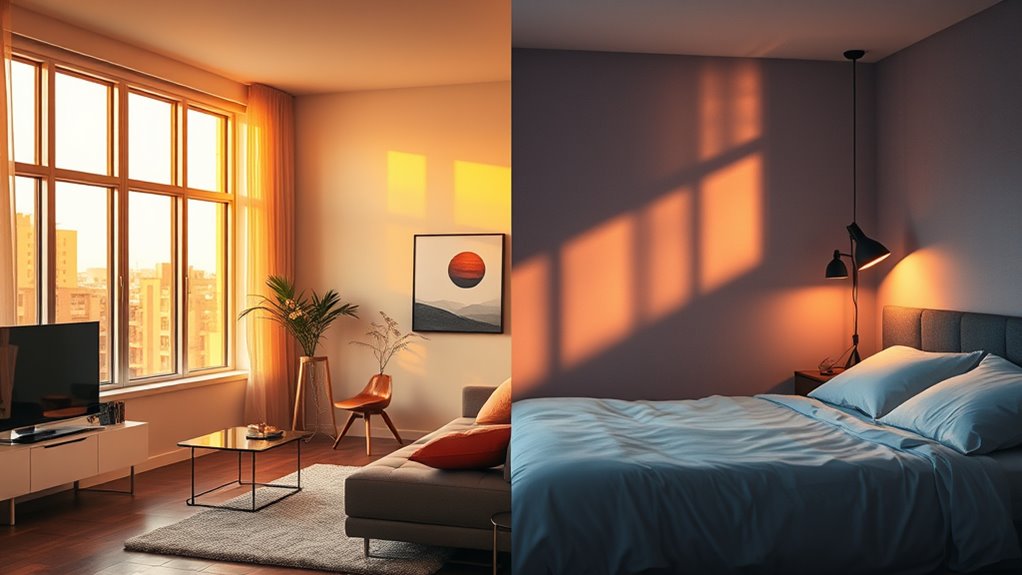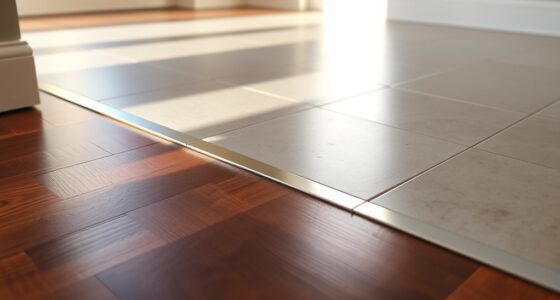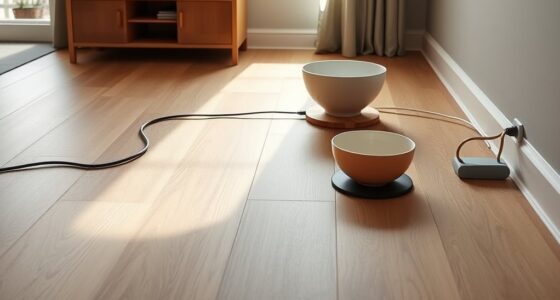Scheduling your night and day runs in a studio apartment depends on your routines and neighbor considerations. Night runs can save energy, lower bills, and offer quiet focus time, but they require mindful noise management to avoid disturbing neighbors. Day activities benefit from natural light and social opportunities but may cost more if scheduled during peak hours. Balancing these factors and creating a flexible plan can boost your comfort and efficiency—stay tuned for more tips on optimizing your schedule.
Key Takeaways
- Schedule high-energy or noisy activities during daytime to leverage natural light and minimize neighbor disturbance at night.
- Conduct low-noise, relaxing tasks like reading or meditation at night to promote restful sleep and reduce disruptions.
- Use off-peak utility rates for energy-intensive chores, typically during night hours, to maximize cost savings.
- Incorporate flexible routines that adapt to personal energy peaks, balancing day and night activities for optimal productivity.
- Manage environmental factors like lighting and sound to create distinct zones supporting either daytime alertness or nighttime relaxation.
Advantages of Night Runs in Small Living Spaces
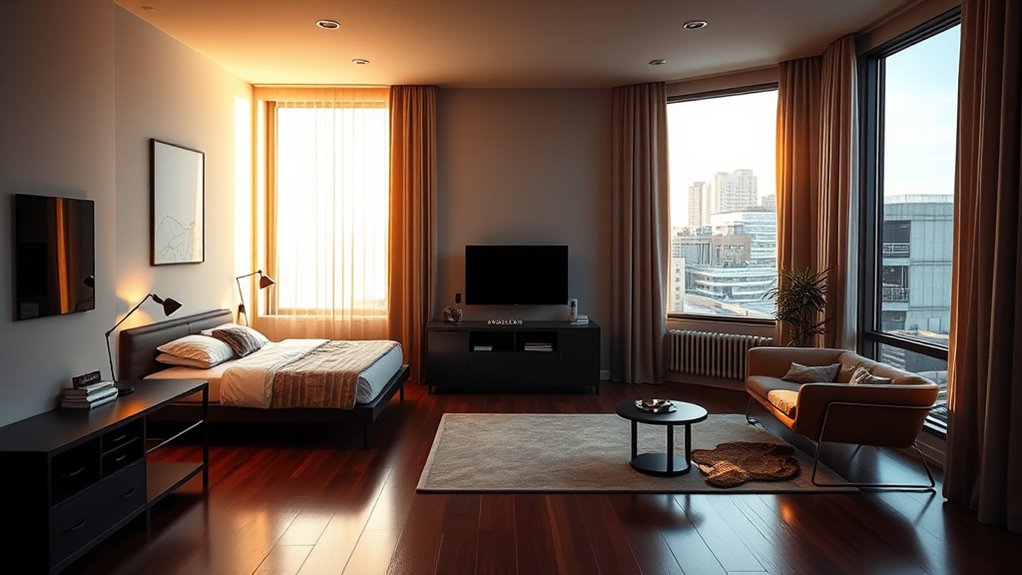
Night runs in small living spaces offer several advantages that can make your daily routine more efficient. When you schedule your runs at night, you often face less foot traffic and fewer interruptions, allowing you to focus fully on your workout. This quieter environment helps you stay consistent without daytime distractions like chores or social plans. Additionally, running at night can help you unwind after a busy day, reducing stress and improving sleep quality. In small apartments, evening runs can be more convenient, saving you time since you don’t need to coordinate with others or navigate crowded gyms. By taking advantage of the quiet hours, you create a routine that fits seamlessly into your lifestyle, making it easier to stay committed to your fitness goals. Incorporating wearable technology like waterproof running watches can further enhance your night runs by tracking your performance accurately.
Benefits of Daytime Activities for Studio Residents
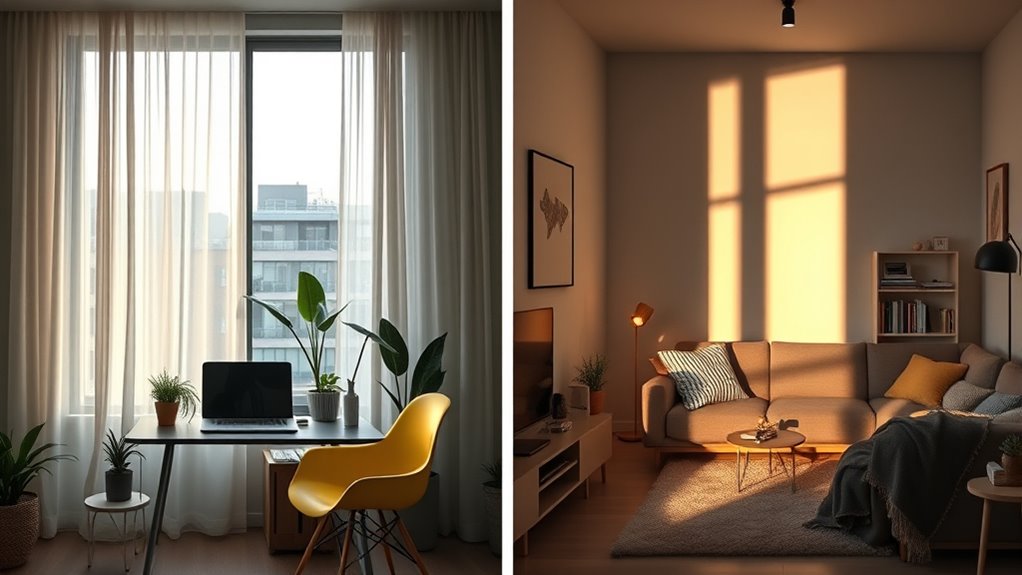
During the day, you can enjoy plenty of natural light that makes your space feel brighter and more inviting. This also opens up more chances to meet neighbors and join social activities outside your apartment. Embracing daytime routines can boost your mood and help you stay connected with your community. Additionally, engaging in daytime activities can reduce reliance on artificial lighting and energy consumption, making your lifestyle more sustainable. energy management
Enhanced Natural Lighting
Natural light flooding into a studio apartment can markedly enhance your daily living experience, especially during daytime activities. It brightens your space, making it feel larger and more inviting. With ample sunlight, you’ll notice improved mood and increased energy levels, helping you stay productive and motivated. Natural light also reduces the need for artificial lighting, cutting down on energy costs and creating a more eco-friendly environment. During the day, sunlight can highlight your decor and make your space look vibrant. It encourages you to spend more time engaging in activities like reading, working, or exercising within your apartment. Additionally, mental wellbeing benefits from increased exposure to natural light, which can help regulate your sleep and improve emotional stability. Overall, enhanced natural lighting creates a healthier, more stimulating atmosphere that boosts your overall well-being throughout the day.
Increased Social Opportunities
Because daylight fills your apartment with energy and visibility, it naturally encourages more social interactions and activities. During the day, you’re more likely to meet neighbors, join community events, or invite friends over. Daytime interactions boost your social life and help build connections. Plus, many activities like gym classes or hobby groups happen during the day, making it easier to participate. Here’s how daytime activities support social opportunities:
| Activity Type | Typical Time | Benefits |
|---|---|---|
| Community Events | Morning/Afternoon | Meet neighbors, build bonds |
| Fitness Classes | Midday | Stay healthy, socialize |
| Coffee Meetups | Afternoon | Casual chats, networking |
| Hobby Groups | Flexible | Shared interests, friendship |
| Workshops | Daytime | Skill-building, interaction |
Engaging during daylight hours makes your social life more vibrant and fulfilling.
Energy Efficiency and Cost Considerations
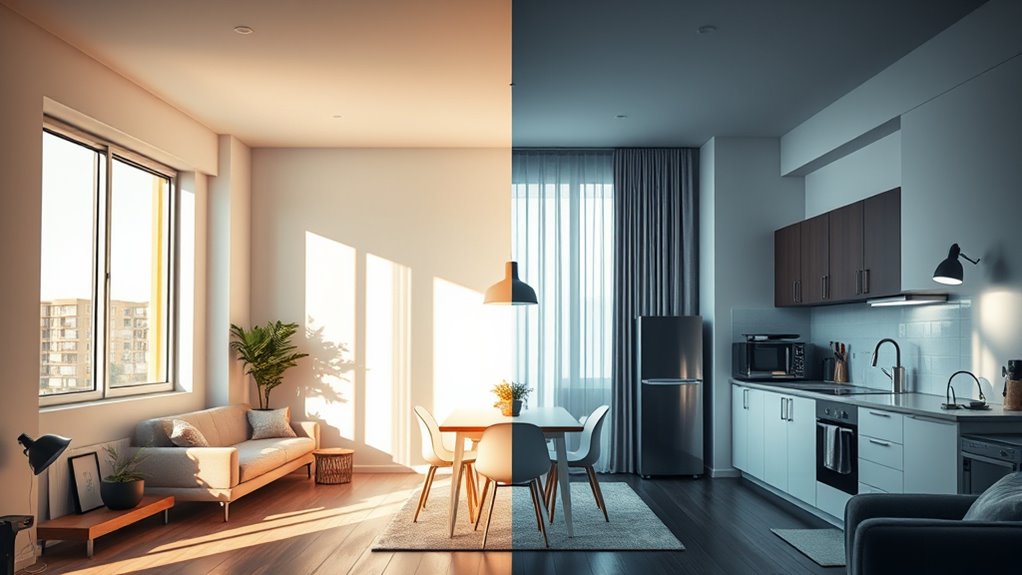
You can save money by running appliances during off-peak hours when utility rates are lower. Nighttime use often consumes less energy due to lower demand, helping you cut costs. Understanding rate differences between day and night helps you make smarter choices about when to run your appliances. Using adjustable settings on your appliances can further optimize energy consumption during these periods.
Lower Energy Consumption at Night
Night runs in studio apartments often lead to lower energy consumption because fewer devices are in use and fewer lights are needed during late hours. This reduction can markedly cut your energy bill. To maximize savings, consider these steps:
- Turn off unnecessary appliances and electronics when not in use.
- Use energy-efficient bulbs for minimal lighting needs.
- Delay high-energy tasks like laundry or dishwasher cycles to nighttime.
- Keep curtains closed to maintain warmth and reduce heating costs.
- Monitoring energy consumption can help identify further opportunities for savings during night runs.
Cost Benefits of Off-Peak Use
Using energy during off-peak hours can considerably boost your savings and improve overall efficiency. When you run appliances, heating, or cooling during these times, you’re often benefiting from lower energy costs and less strain on the grid. This means your utility bills decrease, and your appliances last longer due to reduced wear and tear. Additionally, off-peak usage helps balance energy demand, preventing overloads and reducing the need for additional power generation. By shifting your energy consumption to these hours, you maximize cost benefits while supporting a more sustainable energy system. Implementing smart energy management strategies can further optimize your energy use and savings. This strategy not only saves you money but also promotes responsible energy use, making it a smart choice for budget-conscious and eco-friendly living.
Utility Rate Variations Day vs. Night
Utility rates often fluctuate between day and night, making the timing of your energy use a key factor in managing costs. By understanding these differences, you can optimize your energy habits. Here are four ways to leverage rate variations:
- Use high-energy appliances during cheaper night rates to save money.
- Schedule laundry or running the dishwasher at night when rates are lower.
- Turn off or delay energy-intensive tasks during peak daytime hours.
- Invest in smart devices to automatically shift loads to off-peak times.
- Consider the timing of projector use, especially for activities like home cinema viewing, to maximize energy efficiency and reduce costs during peak hours.
Being aware of your utility’s rate schedule allows you to cut costs and improve energy efficiency. Adjusting your routines based on these fluctuations helps you save money without sacrificing comfort or convenience.
Noise Levels and Neighborly Considerations
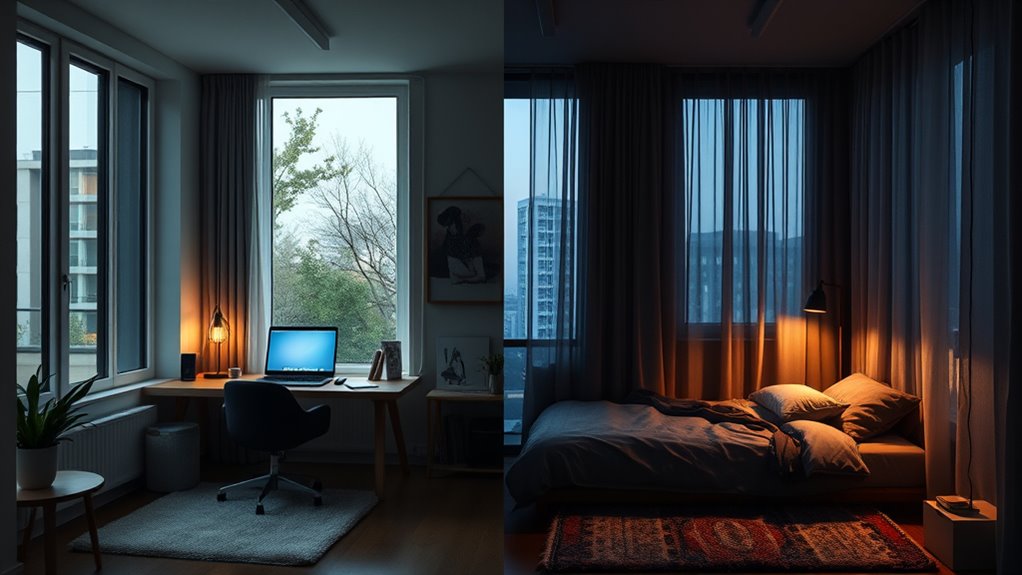
While the quiet hours of a studio apartment can vary depending on your schedule, being mindful of noise levels is essential regardless of the time of day. You should keep noise to a minimum during late-night and early-morning hours to avoid disturbing neighbors. Loud music, TV, or conversations can quickly become disruptive, especially in shared walls or thin partitions. Using headphones or lowering volume levels helps maintain a peaceful environment. Additionally, consider your neighbors’ routines; some may work night shifts or have early mornings. Being courteous by limiting noisy activities during certain hours shows respect and fosters good neighborly relations. Remember, small adjustments in your schedule can prevent conflicts and ensure a comfortable living space for everyone around you. Being aware of sound insulation properties in your apartment can also help you manage noise more effectively.
Creating a Flexible and Effective Schedule
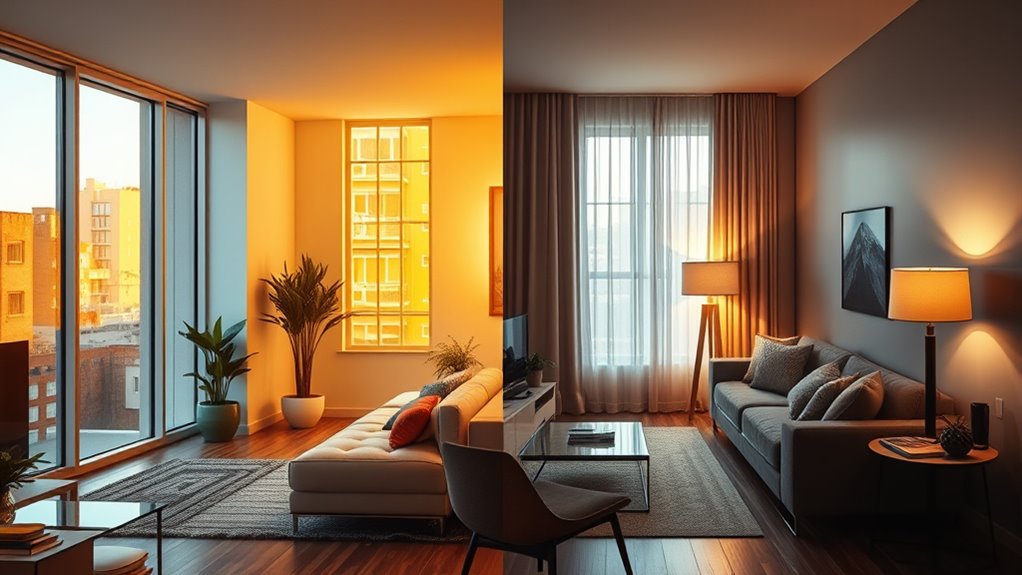
Creating a flexible and effective schedule is key to balancing your activities and maintaining harmony in your studio apartment. Start by identifying your peak productivity times—are you more alert in the morning or evening? Then, prioritize tasks accordingly. To create an adaptable plan, consider these steps:
- Block specific times for work, relaxation, chores, and sleep.
- Build in buffer periods for unexpected tasks or rest.
- Rotate activities to prevent fatigue and boredom.
- Regularly review and adjust your schedule based on your changing needs. Incorporating essential oils for relaxation or focus can enhance your productivity and well-being.
Tips for Balancing Day and Night Routines
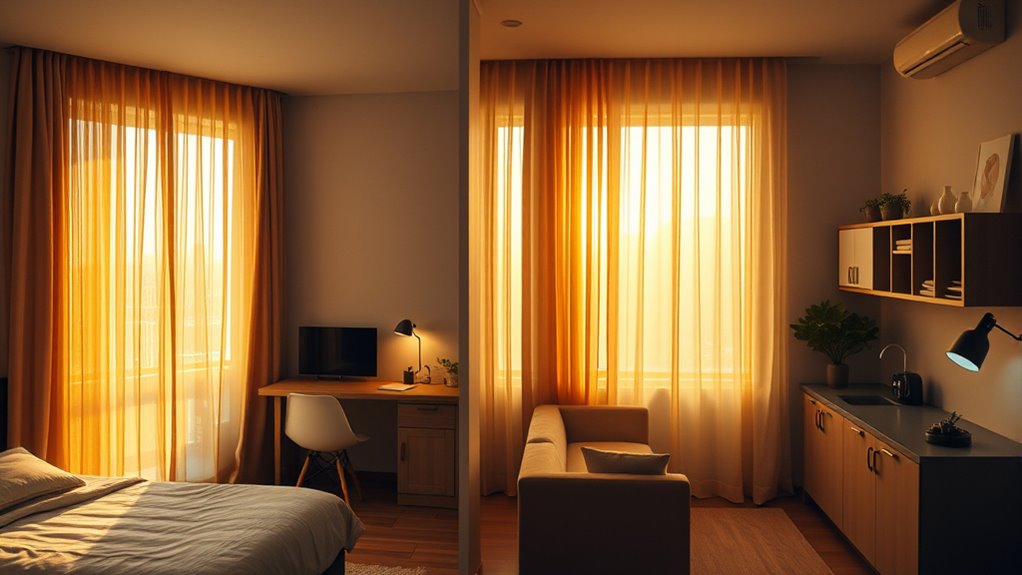
Balancing your day and night routines in a studio apartment requires intentional planning to guarantee you stay energized and maintain harmony. Start by setting clear boundaries between work, rest, and leisure. Use designated areas or specific times for different activities to create a routine that minimizes overlap. Prioritize sleep by establishing a consistent bedtime and creating a calming environment free of screens and noise. Incorporate small breaks during the day to refresh your mind and prevent burnout. Adjust lighting to match the time of day—bright during work hours and softer at night—to signal your body when to be alert or relaxed. Finally, listen to your body’s cues, and don’t hesitate to tweak your routines to keep your energy balanced and your mood positive. Utilizing cookie categories can help tailor your environment and routines for better sleep and productivity.
Frequently Asked Questions
How Do I Determine the Best Running Time for My Personal Routine?
You should consider your energy levels and daily schedule to find the best running time. Track when you feel most alert and motivated, whether that’s morning, midday, or evening. Experiment with different times, paying attention to how your body responds. Stick to a consistent routine once you discover what works best. This way, running becomes easier, more enjoyable, and seamlessly fits into your personal rhythm.
Can Switching Between Day and Night Runs Improve My Productivity?
Switching between day and night runs can boost your productivity by keeping your routine fresh and preventing monotony. You might find that morning runs energize you for the day ahead, while evening runs help you unwind and reflect. By varying your schedule, you adapt to your body’s natural rhythms, stay motivated, and enhance focus. Experiment with both times to discover which best supports your energy levels and daily goals.
What Are the Health Impacts of Running During Different Times of Day?
You might notice that running during the day boosts your mood thanks to natural sunlight, but nighttime runs can help you unwind. However, daytime exercise exposes you to more pollution and allergens, possibly affecting your lungs. Night runs may disrupt your sleep cycle if done too late. Overall, your health depends on balancing these factors, listening to your body, and maintaining consistency to support your well-being.
How Do I Adapt My Schedule During Changing Seasons or Weather?
You should adapt your running schedule by paying attention to seasonal changes and weather conditions. During colder months, try running during the warmest part of the day to avoid frostbite or hypothermia, and in summer, early mornings or late evenings help you dodge the heat. Always check the weather forecast beforehand, dress accordingly, and stay hydrated to keep safe and comfortable no matter the season.
Are There Specific Tips for Maintaining Motivation for Night Runs?
To stay motivated for night runs, set clear goals and remind yourself of the benefits, like stress relief or improved fitness. Keep your runs enjoyable by listening to your favorite music or podcasts, and vary your routes to avoid boredom. Find a running buddy or join local night running groups for accountability. Celebrate small achievements, and remember why you started, so you stay committed even when motivation dips.
Conclusion
Balancing night and day activities in your studio can boost comfort and efficiency. Imagine adjusting your schedule so you work quietly during the day, saving energy, then enjoy relaxing at night without disturbing neighbors. For example, you might work on personal projects in the evening, then rest during quiet daytime hours. Finding this rhythm helps you maximize your small space, making every moment comfortable and productive. With a flexible plan, you create harmony in your busy, cozy home.
